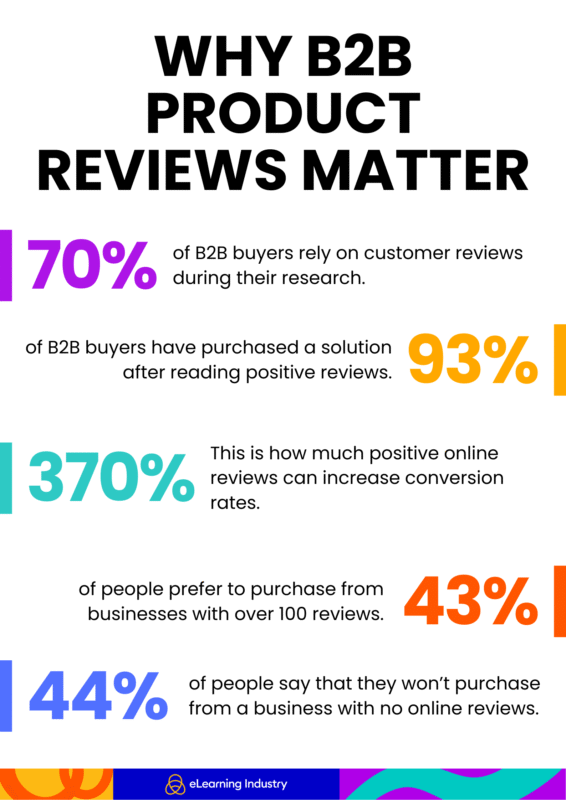Customer Reviews Are Your New Sales Team
So, why are reviews important? A recent survey found that 71% of consumers always read reviews before making a purchase, and 44% wouldn't buy from a company that doesn't respond to reviews. The benefits of customer reviews vary, including increased reputation, customer engagement, improvement, building relationships, awareness, and Search Engine Optimization (SEO). We will analyze all of them as we move on. But why do we say that customer testimonials are your new sales team? Obviously, your sales team is irreplaceable, and you need your expert sales reps to close deals and form bonds. However, reviews make their work easier.
Client reviews aid various stages of the buyer's journey. For starters, customers locate your brand on Google and review sites when searching for relevant products. If they are happy with what they are reading, they will most likely visit your website and check out your services. Another reason companies use customer reviews in marketing is that they help during the conversion stage. You don't have to convince them that you will deliver on your promises. They can see that you are more than capable of doing so through other clients' experiences.
Keep reading to discover more about the importance of online reviews and why you should keep track of them.
In This Guide, You Will Find...
- Why Are Reviews Important? 5 Benefits To Look Out For
- How Do Reviews Increase Sales In Long B2B Sales Cycles?
- How Can You Use The Best Comments?
- Why Is It Important To Always Respond?
- Industry-Specific Review Sites Are More Important Than Generic Places
Why Are Reviews Important? 5 Benefits To Look Out For
1. Reputation
Generally, product testimonials are very reliable, as they don't come from your mouth. They build your reputation and make future buyers trust you more easily. They serve as social proof that helps you generate targeted leads faster than if you were to create an online campaign where you would promote yourself. However, having only 5-star reviews without too much text can be alarming. No company is perfect and keeps all clients 100% happy. Genuine testimonials mention the good and the bad, even if you unfortunately have lower star ratings.
Additionally, glowing reviews that exist only on your website can be suspicious. That's why you should encourage people to leave comments and ratings on Google and other relevant directory submission sites.
2. Customer Engagement
Another reason why reviews are important is that they provide your clients with a place to share their views and experiences. Sometimes, they need to share good review comments for your product or vent regarding a negative experience. Either way, it's an opportunity for you to engage with them and answer their comments, whether good or bad. Remember that it's part of your online reputation management strategy to reply to everyone.
Especially with bad reviews, you should act swiftly to avoid letting a situation get out of hand, where you might require a crisis management firm to advise you in extreme cases. Additionally, when others see that you engage with reviews, they understand how much you care about your clients' feedback and do your best to improve.
3. Business Growth
Positive customer feedback isn't only comments telling you what a great job you did and how amazing your software is. You should take critical comments as positive, too. We know this might sound absurd, but think about it like your clients did you a favor by informing you about your mistakes. How will you avoid repeating them if nobody tells you about them? Basically, software testimonials help you act on feedback, make improvements, and show your customers how much you value their input. In the long run, you'll be able to reduce customer churn by fixing mistakes that cost you significant revenue.
4. Long-Lasting Customer Relationships
Online reviews allow you to engage with customers, as already mentioned. However, your answers shouldn't feel standard. Many businesses create templates to speed up response time. However, this approach often feels generic. When you respond the exact same way to everyone making a complaint, you are not exactly showing your willingness to improve. Our advice is to treat every comment differently. Additionally, you might contact a client directly to resolve their matter.
This way, you actively show that you care deeply about solving their problem and improving their experience. Sometimes, clients like your product but encounter other issues, including poor customer service or slow email response times.
5. SEO Effects
You've probably heard a lot about SEO strategies and how they boost your online visibility and brand awareness. Reviews and star ratings play a significant role in improving your SEO and helping you rank higher. Google takes reviews into serious consideration when it comes to understanding the value of a company and its products. It is more likely to suggest a company with great ratings instead of a business that suffers from negative comments.
Additionally, lengthy reviews often feature relevant keywords that other users may be searching for. This means that you receive more organic traffic, decreasing your ad spend and boosting potential conversions.

How Do Reviews Increase Sales In Long B2B Sales Cycles?
-
Reach More People Online
Imagine someone is searching for Learning Management Systems (LMSs) with a simple Google query, and your business is nowhere to be found on the first page. This person may never learn about your offerings. Reviews are one of the many trust signals in marketing and have the ability to increase your Google ranking. When Google sees that your clients trust you, it boosts your ranking, helping you appear higher when someone uses relevant search queries. Not only that, but it might also show your rating score under your listing, improving click rates.
Moreover, when users don't exit your domain immediately upon visiting it, it shows Google that you offer the answers people are searching for. It's proof that you should appear at the top of the page when someone uses specific keywords during their search.
That's why you should submit your brand to niche-specific PPC directories and learn how to ask for reviews. This way, not only do you increase your social proof, but you also generate high-quality backlinks.
-
Improve Brand Image With Testimonials
Up to this point, you must have a pretty clear understanding of why reviews are important. But how can they further improve your conversions? Simply featuring reviews on your website isn't enough. Many businesses have made a habit of including fake positive reviews on their landing pages. To generate high-quality business leads and drive them to conversion, you must encourage honest comments from your clients. These testimonials create a great first impression, making new prospects want to know more about you and your services.
Once you book a meeting and discuss their needs, they'll need even more proof that you are legit and can deliver on your promises. Detailed testimonials can provide them with reassurance that you are capable of offering high-quality services. Prospects can check other people's similar experiences and results.
Another proven tactic you can use to increase review-driven conversions is to publish case studies. Why? You show prospects exactly the problem you were handed, your methodology, the struggles you overcame, and the final result.
-
Leverage User-Generated Content (UGC)
There is no simple guide on how to close a sale. However, online business reviews with high-quality UGC photos and videos can be the perfect proof of your product's value. In fact, 82% of customers are more likely to purchase from companies that use UGC photos and videos instead of generic images. However, you may be wondering how you can follow this tactic in the B2B SaaS world. It is very easy for eCommerce sites to do this, but how can you successfully implement it? Let's say a customer purchased your employee engagement software. They might share a side-by-side comparison image of the percentage of engaged employees with your product vs. their previous tool.
Or they may create a quick video explaining how your software simplified their daily work while showing the functionality of your product. You may then use this material and promote it on your website, social media, and online campaigns.
-
Customer Lifetime Value
To get customer reviews, you must ask your clients for their opinion and give them a variety of software review platforms they can visit and submit their experiences. Over time, not only will you start getting new customers more easily, but you will also improve customer lifetime value. Recurring revenue is tremendously important for any company to make predictions about the future and invest in growth initiatives. The happier your customers are, the more money they'll spend with you. And asking for their feedback and engaging with them shows that you care about meeting their demands and improving your services.
If you want to check out the best ways to ask for reviews, check out this article.
How Can You Use The Best Comments?
- Feature them on your website.
- Showcase them on product pages.
- Put them on email campaigns.
- Include them in paid ads.
- Feature them in video testimonials.
Why Is It Important To Always Respond?
We have already established why reviews are important for online reputation for tech vendors. However, is your job done once you get your clients to review your business? Absolutely not. This is only part of the job, as you still have to engage with your reviews, note down positives and negatives, and start using feedback to make improvements. Many companies use review software to get notified every time a new review appears and automate certain replies. Let's see how you can reply to all online reviews, positive, neutral, and negative:
- Don't use generic, copy-paste answers for negative reviews. People don't like seeing the same reply to everyone's comment. They need to feel that you actually care about their feedback and that you are willing to do something about it. So, apart from giving them a unique answer, you can message them personally to find a solution.
- You would assume that all reviews are equal. Well, not really. You need verified users to leave their feedback to boost the testimonial's credibility. Verified users are people or companies with whom you've worked, and others can clearly see their names.
- You can build an online community where users can discuss their issues with you or celebrate their wins. This way, other clients and potential buyers can see how successful your solution is. In these spaces, you can adopt a more approachable profile, discussing in a friendly manner.
- Many businesses incentivize clients for leaving reviews by offering gifts, discounts, and free access to events. However, we don't advise you to follow this tactic, as you may end up with fake reviews from unverified users who only care about winning the prize.
Industry-Specific Review Sites Are More Important Than Generic Places
There are so many software review platforms for B2B SaaS businesses where you can check customer review examples. Some of them feature brands for all industries, while others focus on specific niches. Being featured on as many of these platforms as possible is ideal, but we think you should care more about industry-specific sites, even if their traffic is lower. The logic is simple. A generic platform may receive 800,000 visitors per month, out of which only 10,000 are related to your niche. On the other hand, a niche-specific website may receive 100,000 visitors, exclusively dedicated to the eLearning and HR tech fields.
-
Trustpilot
Offers a wide range of brand and product reviews in various niches. However, reviews may be emotionally driven and not factual. Also, paid business accounts influence review visibility.
-
TrustRadius
It features 400+ B2B tech categories, with verified reviews and helpful customer advice. However, it usually features lengthy reviews, making it hard to quickly scan them and make comparisons.
-
Product Hunt
The reviews feel fresh and unbiased, focusing on the latest B2B SaaS tools. Like Reddit, it offers an upvoting function to crown software winners. However, it mostly features new tools and not established businesses. Also, many reviews are upvoted due to hype.
-
Software Advice
With over 2 million verified reviews, it helps businesses find the right tool for them, using tailored recommendations. It's created mostly for businesses, not individual buyers.
-
eLearning Industry
eLI has been in the eLearning and HR tech fields for years. Its PPC directories allow businesses to encourage their users to leave reviews. This way, whenever business opportunity leads visit your listing, they can also see your star rating and read reviews in depth. To appear at the top of the list and put your testimonials on display, upgrade your listing. This is how you'll get ahead of your competition.
Key Takeaway
Customer reviews are no longer just feedback; they are powerful tools that shape buying decisions. In B2B markets, they play a key role in building B2B buyer trust. When prospects see real experiences from verified clients, it becomes easier for them to believe in your ability to deliver. Reviews also reduce the pressure on your sales team by supporting their efforts with proof from satisfied customers.
The impact of reviews on sales is clear: positive, authentic feedback can influence prospects at every stage of the buyer journey. By encouraging customers to leave detailed and honest comments, you create social proof that attracts new leads and keeps existing clients engaged. Pairing this with consistent brand monitoring ensures you can quickly respond to any negative feedback, highlight the positive, and maintain a strong online reputation.
To get the most from reviews, you should also track performance metrics. Regularly check website rankings to see if your visibility improves as your review profile grows. When combined with ongoing engagement, SEO efforts, and content updates, reviews can become a steady source of leads and conversions. By treating them as part of your core marketing strategy, you set your brand up for long-term trust and growth.
Frequently Asked Questions (FAQ)
Reviews are seen as honest feedback from real people, not marketing claims. They act like digital word-of-mouth, giving shoppers confidence in products and services.
Positive reviews build confidence. When prospects read what other users have experienced, it reduces doubts and makes them more likely to buy, especially for higher-priced products.
Absolutely. Too many perfect reviews feel fake. Having a mix of good and not-so-good feedback makes the overall review profile more believable and trustworthy.
Yes. Reviews include keywords and fresh content that search engines love. They help your software rank higher on Google and other platforms.
In B2B settings, decisions often take longer. Reviews help to speed up those cycles by showing real success stories, reducing uncertainty, and building trust along the way.


